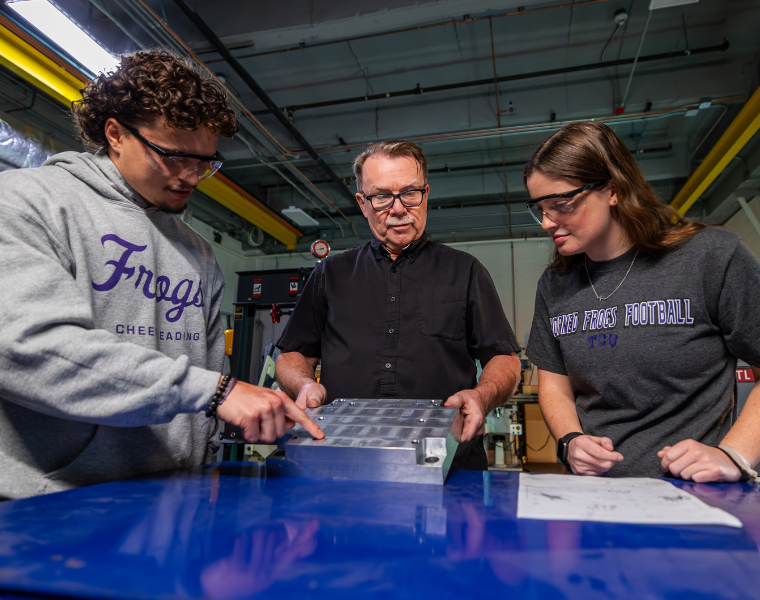Accreditation
The TCU Engineering program is accredited by the Engineering Accreditation Commission (EAC) of ABET, https://www.abet.org.

Program Educational Objectives
In developing a program with a strong foundation in engineering within a traditional
liberal arts setting, the faculty and staff of the Department of Engineering at TCU
with input from other constituents have established the following Program Educational
Objectives.
- be serving others as practicing engineers, or as other service professionals.
- be advancing in leadership tracks in industry, government, national service, or non-profits, while building reputations as ethical and responsible community members.
- be engaged in the pursuit of knowledge and skills through professional development opportunities, and/or graduate education.
- Students and their families
- TCU engineering faculty and their families
- Employers (primarily in the Metroplex)
- College of Science & Engineering
- TCU engineering alumni
- TCU Administration and the Board of Trustees
- Professional schools
- TCU Engineering Board of Advisors
- The Dean of the College
- TCU military ROTC departments
- Educational outreach programs
- Professional societies
- Companies dependent on TCU for engineering consultants
- an ability to identify, formulate, and solve complex engineering problems by applying principles of engineering, science, and mathematics
- an ability to apply engineering design to produce solutions that meet specified needs with consideration of public health, safety, and welfare, as well as global, cultural, social, environmental, and economic factors
- an ability to communicate effectively with a range of audiences
- an ability to recognize ethical and professional responsibilities in engineering situations and make informed judgments, which must consider the impact of engineering solutions in global, economic, environmental, and societal contexts
- an ability to function effectively on a team whose members together provide leadership, create a collaborative and inclusive environment, establish goals, plan tasks, and meet objectives
- an ability to develop and conduct appropriate experimentation, analyze and interpret data, and use engineering judgment to draw conclusions
- an ability to acquire and apply new knowledge as needed, using appropriate learning strategies.
| ACADEMIC YEAR |
ENROLLMENT YEAR | TOTAL UNDERGRAD | DEGREES AWARDED | |||
| 1st | 2nd | 3rd | 4th | |||
| 2025-2026 | 105 | 69 | 59 | 53 | 286 | 53 |
| 2024-2025 | 90 | 68 | 51 | 39 | 248 | 39 |
| 2023-2024 | 110 | 55 | 43 | 46 | 254 | 46 |
| 2022-2023 | 101 | 45 | 54 | 54 | 254 | 54 |
| 2021-2022 | 88 | 67 | 52 | 50 | 257 | 50 |
| 2020-2021 | 98 | 59 | 47 | 42 | 246 | 42 |
| 2019-2020 | 91 | 54 | 53 | 56 | 254 | 56 |
| 2018-2019 | 84 | 60 | 63 | 62 | 269 | 56 |
| 2017-2018 | 96 | 65 | 68 | 35 | 264 | 37 |
| 2016-2017 | 105 | 72 | 40 | 36 | 253 | 37 |
Board of Advisors
- Camille Barton, P.E., LEED AP, CEO, Purdy-McGuire, Inc
- Jen Jewers Bowlin, Distribution & Cold Storage Practice Director, Principal, Henderson Engineers
- Tom Brooks, Sr. Technical Fellow, Software Systems & Certification and Technical Competency Lead, Bell Textron
- James D. Engelland, Ph.D., Consultant, Lockheed Martin Aeronautics (retired)
- Sean Haight, PhD, Senior Staff Passive Safety Performance Engineer, Tesla
- Tom Hill, University of Texas Dallas, Fellow, HP Enterprise Services
- Joel Hron, Chief Technology Officer, Head of AI & Labs, Thomson Reuters
- Beth Kush, Program Manager, Lockheed Martin Aeronautics
- Steve Lewis, Principal Dynamics Engineer, AVX Aircraft
- Cindy Milrany, CFO and Chief Strategy Officer, Freese & Nichols
- Fraser Ringel, P.E., Energy & Power Group, Principal, Jacobs, Inc.
- Ryan Savage, Senior Member Technical Staff, Texas Instruments, Inc.
- Jonathan Schwartz, Regional Operations Director Global Facilities and OnSite Energy & Power Manager, Principal, Burns & McDonnell
- Bobby Williams, Aerospace Consultant, Lockheed Martin Aeronautics (retired)